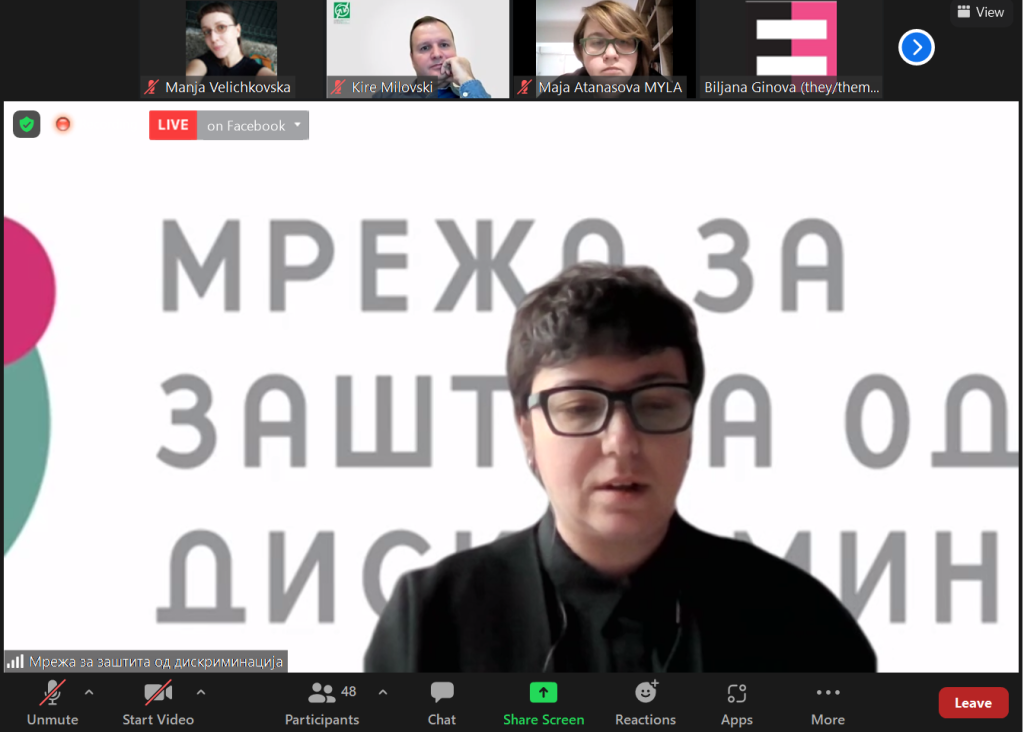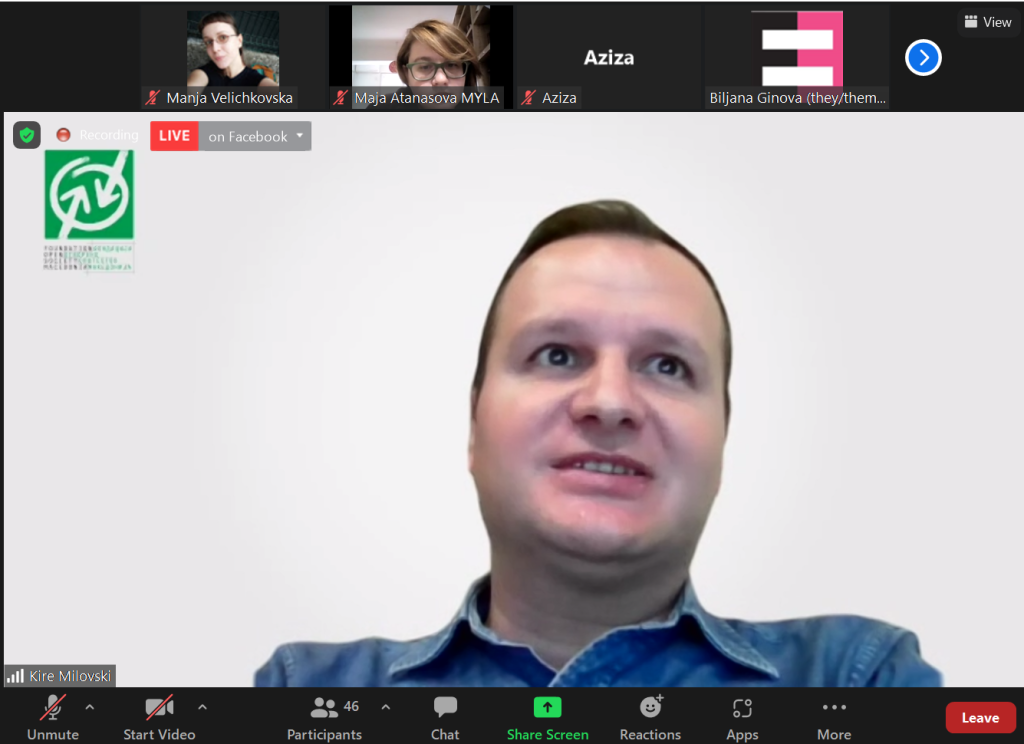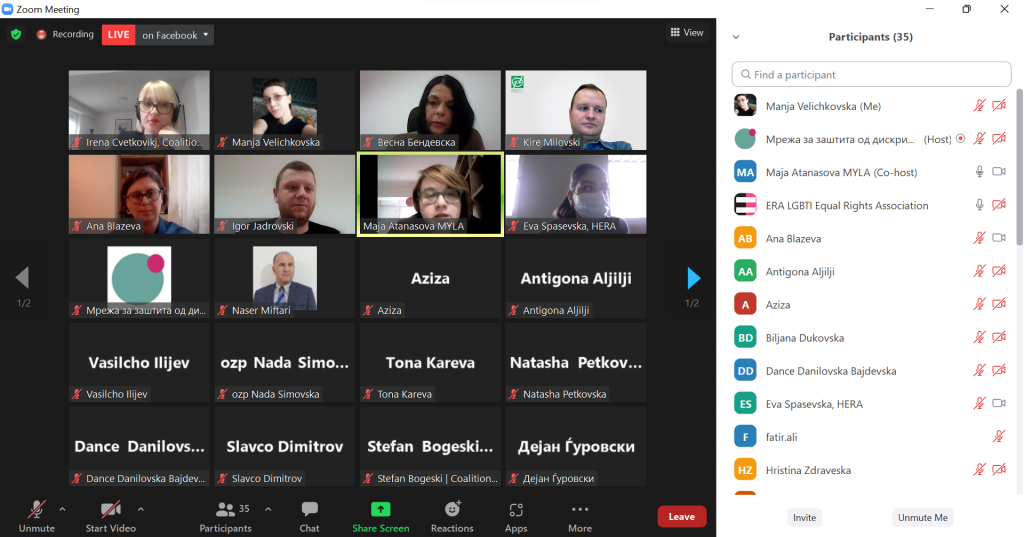On February 28th 2022 (Monday), the Network for protection against discrimination held final conference dedicated to social justice and inequality as key problems in our society, which for decades now have generated poverty and social injustice for some people and at the same time illegal privileges for others.
The event was moderated by Maja Atanasova, a law graduate from the Macedonian Young Lawyers Association and Kire Milovski, program coordinator of the Foundation Open Society – Macedonia, who was in charge of the introductory part introduced the presentations of findings and the recommendations by two research procedures the Network conducted in 2021. In his presentation, Milovski addressed the goals and needs of the research: ‘The need for the first research ‘EVERYDAY LIFE AND EMOTIONAL LIFE OF INJUSTICE: DISCRIMINATION, HEALTH AND RELATIONS’ BY THE AUTHORS ANA BLAZHEVA AND SLAVCHO DIMITROV, emanating from the longstanding experience and comprehension for the unfavorable position and the multitude of unfavorable factors which affect the marginalized social, ethnic and sexual minorities. For that very reason, the idea was to encompass different aspects and impacts on the position of minorities and their marginalization through subjective experience and quests of discrimination and injustice, as well as their overall health and social well-being.’
THE REPORT ON MONITORING LAW ENFORCEMENT OF SOCIAL PROTECTION IN THE SEGMENT OF SOCIAL SERVICES BY THE AUTHORS TONA KAREVA, HRISTINA ZDRAVESKA AND ANTIGONA ALJILI, gives evaluation of the functionality regarding the existing services for social protection, pointing out the enforcement of the current Law on social protection and the functionality of the centers of social work and other providers of social services. This law is focused on three target groups: Roma population, women victims of violence and people with disabilities, right because of their specific place in the society. Due to the specific place these groups have in the society, on everyday basis they encounter discrimination and inability to integrate themselves in the society where they largely depend on social transfers.
Milovski emphasized that the highest priority of the Foundation Open Society – Macedonia is the life protection and life improvement of the marginalized citizens and that in this course goes the continuous support for the Network for prevention and protection against discrimination from its establishing in 2010 until now.
In 2022 the focus of support will be placed on promoting the policy and practices for protection against discrimination as well as promoting equality; all in the course of contribution to establishing equal society through promotion of the policies and practices for prevention and protection against discrimination.
At the introductory panel of the conference, Elena Petrovska,Elena Petrovska, program coordinator of the Coalition MARGINS and coordinator of the Network for protection against discrimination, presented the Network’s overall work in the field of representing laws and public policies, providing legal aid and research work, and she also presented the new website of the Networkwhere each person could report discrimination and/or to inform oneself on member organizations of the Network and their services on providing free legal aid and other types of services in cases of discrimination.
Irena Cvetkovikj, executive director of the Coalition MARGINS, who was moderating the discussion related to publishing the research ‘Everyday life and emotional life of injustice: Discrimination, health and relations’, by athors Ana Blazheva and Slavcho Dimitrov, pointed out that: ‘This publication is a comprehensively well-argued, and at the same time outstandingly warm and emotional reading. ‘I am beyond happy that we have a research which succeeds in pulling through some capitalistic sense and which does not aim for protection or spares the system, but it is rather focused on people’.
The research’s aim is to offer a summary on how discrimination and injustice impact everyday life, shape experiences and points of view and frame the social position, relations and worlds of the marginalized social, ethnic and sexual minorities, i.e. those three chosen target groups: textile industry workers; Roma male and female population; lesbians, bisexuals and gay man (LBG).
Natasha Petkovska,legal advisor at the Helsinki Committee for Human Rights moderated the second panel which included the presentation of ‘The Report on monitoring law enforcement of social protection in the segment of social services during the period June – July 2021’, by authors Tona Kareva, Hristina Zdraveska and Antigona Aljuli.The report speaks about the importance of providing social services of good quality in terms of mitigating poverty and promotion of autonomous and decent citizens’ life. The authors considered passing the new 2019 Law on social security which formed the legal basis for establishing new services for assisting particular groups in easier access to information, integration, resocialization and in general, simpler operating in the community where they live. Their report evaluated the functionality of the existing services for social protection with special emphasis on the current Law enforcement on social protection and the functionality of the social work centers as well as other providers of social services. The text is focused on three main groups: Roma population, women victims of violence and people with disabilities, who right because of their specific place in the society, encounter discrimination and inability to integrate themselves in the society on everyday basis and they greatly depend on social transfers.
The video recording of the conference can be found at:
https://www.facebook.com/mrezazazastitaoddiskriminacija/videos/993040701629622
Event photo gallery

Елена Петровска, координаторка на Мрежа за заштита од дискриминација

Кире Миловски, Програмски координатор, Фондација Отворено општество – Македонија


Настанот беше организиран во рамки на проектот „Мрежа за заштита од дискриминација: Здружена акција за унапредување на еднаквоста и социјалната правда на маргинализираните заедници“ а финансиски поддржан од Фондација Отворено општество – Македонија.